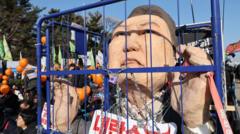In the early hours of the morning, South Korea found itself in an unprecedented political drama when a standoff occurred outside the residence of suspended President Yoon Suk Yeol. Supporters of Yoon, outraged over his potential arrest, gathered en masse to prevent law enforcement from executing an arrest warrant. The scene was charged with emotion, as many supporters expressed their fear and discontent, some in tears, fearing for Yoon's fate.
The situation escalated as police attempted to breach Yoon's residence, only to be met with a human wall of security personnel and soldiers loyal to the president. Reports indicated that these loyalists, numbering around 200, physically blocked access, sometimes brandishing weapons. In light of the untenable situation and concerns for their safety, investigators ultimately decided to halt their attempt, leaving many onlookers in disbelief at the sight of law enforcement being thwarted.
This event marks an unprecedented chapter in South Korean politics: the potential arrest of a sitting president. Following Yoon's impeachment three weeks prior, the nation finds itself scrambling for a response to this extraordinary challenge. The political climate has turned contentious, exposing the thin veneer of constitutional order that many observers argue is now at risk.
The implications of Yoon's actions are profound. Allegations of insurrection and previous calls for martial law raise concerns about the overall governance of South Korea. Yoon's close circle of loyalists, many of whom were placed in significant positions of power by him, have been criticized for fostering an environment conducive to political unrest. Despite pressure to cooperate with investigators, Yoon has remained unyielding, prompting authorities to consider a forceful approach.
Amidst this tumultuous backdrop, a noticeable divide has emerged among the public. While many South Koreans have expressed anger at Yoon's leadership and recent decisions, a fervent group of supporters continue to rally around him. Their slogans reflect broad discontent with the current political establishment, manifesting in overnight vigils outside his residence. The supporters, armed with conspiracy theories about election outcomes and external infiltration, have vowed to protect their president at all costs, raising alarms about the potential for further escalation.
As the deadline for the arrest warrant approaches, attention is also shifting to Choi Sang-mok, South Korea's interim president, and whether he will exercise authority over Yoon's security apparatus. Meanwhile, calls for police to take assertive actions against those obstructing the arrest are growing louder from opposition parties.
Should investigators attempt to address this high-stakes drama again, they will likely have to adopt a new strategy, engaging in dialogue with security forces to avoid another failed attempt. For now, as Yoon’s supporters celebrate their perceived victory, the broader implications of this crisis for South Korean democracy and governance remain uncertain. With the weekend looming, tensions are expected to rise further, intensifying public interest in how events will unfold in the coming days.
The situation escalated as police attempted to breach Yoon's residence, only to be met with a human wall of security personnel and soldiers loyal to the president. Reports indicated that these loyalists, numbering around 200, physically blocked access, sometimes brandishing weapons. In light of the untenable situation and concerns for their safety, investigators ultimately decided to halt their attempt, leaving many onlookers in disbelief at the sight of law enforcement being thwarted.
This event marks an unprecedented chapter in South Korean politics: the potential arrest of a sitting president. Following Yoon's impeachment three weeks prior, the nation finds itself scrambling for a response to this extraordinary challenge. The political climate has turned contentious, exposing the thin veneer of constitutional order that many observers argue is now at risk.
The implications of Yoon's actions are profound. Allegations of insurrection and previous calls for martial law raise concerns about the overall governance of South Korea. Yoon's close circle of loyalists, many of whom were placed in significant positions of power by him, have been criticized for fostering an environment conducive to political unrest. Despite pressure to cooperate with investigators, Yoon has remained unyielding, prompting authorities to consider a forceful approach.
Amidst this tumultuous backdrop, a noticeable divide has emerged among the public. While many South Koreans have expressed anger at Yoon's leadership and recent decisions, a fervent group of supporters continue to rally around him. Their slogans reflect broad discontent with the current political establishment, manifesting in overnight vigils outside his residence. The supporters, armed with conspiracy theories about election outcomes and external infiltration, have vowed to protect their president at all costs, raising alarms about the potential for further escalation.
As the deadline for the arrest warrant approaches, attention is also shifting to Choi Sang-mok, South Korea's interim president, and whether he will exercise authority over Yoon's security apparatus. Meanwhile, calls for police to take assertive actions against those obstructing the arrest are growing louder from opposition parties.
Should investigators attempt to address this high-stakes drama again, they will likely have to adopt a new strategy, engaging in dialogue with security forces to avoid another failed attempt. For now, as Yoon’s supporters celebrate their perceived victory, the broader implications of this crisis for South Korean democracy and governance remain uncertain. With the weekend looming, tensions are expected to rise further, intensifying public interest in how events will unfold in the coming days.



















